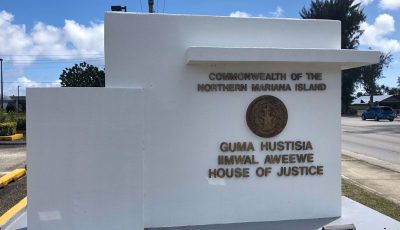SC affirms man’s conviction for sexually abusing minor girl
»Justices, however, vacate sentence; order resentencing
The CNMI Supreme Court has affirmed the conviction of Alfredo Evangelista Reyes, a man who was slapped in 2014 with the maximum of 30 years in prison for sexually abusing a then 16-year-old girl in 2009.
The high court, however, found that Superior Court Associate Judge Joseph N. Camacho abused his discretion by denying Reyes’ request for a presentence investigation report.
The high court vacated the sentence and remanded the matter to the Superior Court for resentencing.
The Supreme Court concluded that because there was ample evidence supporting a sexual abuse of a minor in the first degree conviction, Reyes fails to demonstrate a reasonable probability the error affected the outcome of the proceeding.
Associate Justice Perry B. Inos issued the opinion. Chief Justice Alexandro C. Castro and Associate Justice John A. Manglona concurred the ruling.
According to the prosecution, Reyes sexually abused the girl at Laulau Beach in May 2009, at Coral Ocean Point beach in September 2009, and in the jungle area near Hawaiian Rock Co. in December 2009.
On Dec. 13, 2013, a Superior Court jury reached a unanimous verdict, finding Reyes guilty of three counts of sexual abuse of a minor in the first degree.
Camacho, who presided over the misdemeanor charges, found the defendant guilty of three counts of assault and battery.
On Jan. 22, 2014, Camacho sentenced the then-51-year-old Reyes to the maximum sentence of 30 years imprisonment and, among other conditions, required him to register as a sex offender.
Camacho said so that Reyes and others who sexually abuse children will be justly punished and deterred, he imposes the full maximum sentence of 30 years, to be served day for day, without the possibility of parole, probation, early release, weekend or work release, or other similar programs.
Camacho said his court will hear children who seek protection from sexual abuse.
Reyes then appealed, asking the Supreme Court to reverse his conviction and sentence.
In his appeal, Reyes, through counsel attorney Vincent J. Seman, argued that Camacho erred by failing to read substantive jury instructions following the close of evidence and by denying his request for presentence investigation report.
In the high court’s opinion issued on Friday, the justices ruled that in order to prove sexual abuse of a minor in the first degree, the law requires the Commonwealth demonstrate the defendant was 18 years of age or older; engaged in sexual penetration with someone who was under the age of 18; and was the alleged victim’s natural parent, stepparent, adopted parent, or legal guardian.
The justices said critically, the victim specifically testified that on each occasion, Reyes removed his clothing, directed the victim to undress, forced himself upon her, and caused pain in her private parts.
The justices said Camacho’s instructions for the dismissed charges were removed from the jurors’ packets and the jury was twice instructed to disregard those charges.
The justices said Camacho also directed the jury to disregard instructions that were removed from the jackets.
The justices said there is no indication the jurors were confused by the dismissal of charges or by the removal or instructions from their packets.
Furthermore, the justices said, Reyes does not show how consideration of the discarded instructions or dismissed charges could have caused the jury to convict when it would otherwise find him not guilty.
“Thus Reyes’ claim that the court’s error could have lead to jury confusion is merely speculative,” the justices said.
On the presentence investigation report issue, citing a precedent high court ruling, the justices said Camacho justified his denial of a presentence investigation report because of the straightforwardness of the case.
Further, the justices said, Camacho neither explained how the record contained the information that a presentence investigation report would have included nor did he conduct a de facto presentence investigation report on the record.
Assistant attorneys general Barbara P. Cepeda and Betsy Weintraub appeared for the government at the hearing before the high tribunal.



























